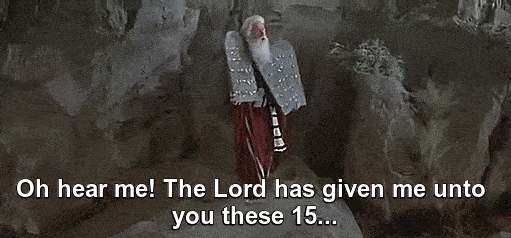Originally published at: https://boingboing.net/2018/09/25/scholastic-fixes-greedy-copyri.html
…
Kudos to Scholastic I guess for giving in to pressure to stop doing the evil thing they were doing.
Remember, it is only “evil” if you get caught 
The ineluctable eleventh commandment: Thou shalt not get caught!

There must be a reason for that rule, because it’s been on everything since I was a kid. That’s not to say it’s good or necessary. Maybe it allows their marketing people to get on with their work without fear of getting sued? If only there was a lawyer here to explain things, so we wouldn’t be forced to just make up opinions without any facts, like the internet!
At a guess, grab as much copyright as they could get away with so that they’d be legally protected no matter what they or their successors did with the material, good or bad, and ignore the potential negative consequences of demanding the kids submitting their work surrender their creative rights. When there’s a finite shield against legal liability, you can bet their bottom dollar that the corporation with a law firm on retainer is going to hog as much of it as they can irrespective of the cost to anyone else. Scholastic’s lawyers might even have decided on the overkill strategy by default.
We have facts. What we don’t have are legal expertise with which to evaluate those facts. Luckily, we’re not a court of law; we’re a bunch of snarky malcontents on the promenade deck of the good ship Boing Boing.

Scholastic inadvertently provided these kids what teachers call a “learning opportunity.” Glad that they followed through on it.
I’m not sure if you’re joking but I’m going to risk being “that guy” and reply anyway. I r a lawyer and I think you’re probably exactly right, but my first thought when reading that was “Jesus, I’d hate to be the company lawyer trying to argue to a judge why the judge should enforce a copyright assignment buried in the small print of a contract signed by an 8th grader”.

Plus once it’s made it’s way into one set of competition/awards submission rules, it’s hard to shift.
Inertia in drafting means everyone copies the existing precedents blindly up and until something happens to make someone with sufficient knowledge look at it and say “Why are we doing it this way?”.
Yup, that’s my guess, boilerplate contract text, and there’s a good chance their firm’s other clients also have it in theirs and may not even realize it.
This topic was automatically closed after 5 days. New replies are no longer allowed.
